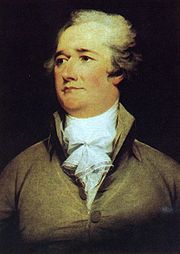
Federalist No. 84
Encyclopedia

Essay
An essay is a piece of writing which is often written from an author's personal point of view. Essays can consist of a number of elements, including: literary criticism, political manifestos, learned arguments, observations of daily life, recollections, and reflections of the author. The definition...
entitled "Certain General and Miscellaneous Objections to the Constitution Considered and Answered," is one of the Federalist Papers
Federalist Papers
The Federalist Papers are a series of 85 articles or essays promoting the ratification of the United States Constitution. Seventy-seven of the essays were published serially in The Independent Journal and The New York Packet between October 1787 and August 1788...
by Alexander Hamilton
Alexander Hamilton
Alexander Hamilton was a Founding Father, soldier, economist, political philosopher, one of America's first constitutional lawyers and the first United States Secretary of the Treasury...
, published under the pseudonym
Pseudonym
A pseudonym is a name that a person assumes for a particular purpose and that differs from his or her original orthonym...
Publius on July 16, July 26, and August 9, 1788.
Federalist No. 84 is notable for presenting the idea that a Bill of Rights
United States Bill of Rights
The Bill of Rights is the collective name for the first ten amendments to the United States Constitution. These limitations serve to protect the natural rights of liberty and property. They guarantee a number of personal freedoms, limit the government's power in judicial and other proceedings, and...
was not a necessary component of the proposed United States Constitution
United States Constitution
The Constitution of the United States is the supreme law of the United States of America. It is the framework for the organization of the United States government and for the relationship of the federal government with the states, citizens, and all people within the United States.The first three...
. The Constitution, as originally written, did not specifically enumerate or protect the rights of the people. It is alleged that many Americans at the time opposed the inclusion of a bill of rights: if such a bill were created, they feared, this might later be interpreted as a list of the only rights that people had. Hamilton wrote:
- It has been several times truly remarked, that bills of rights are in their origin, stipulations between kings and their subjects, abridgments of prerogative in favor of privilege, reservations of rights not surrendered to the prince. Such was Magna CartaMagna CartaMagna Carta is an English charter, originally issued in the year 1215 and reissued later in the 13th century in modified versions, which included the most direct challenges to the monarch's authority to date. The charter first passed into law in 1225...
, obtained by the Barons, sword in hand, from king JohnJohn of EnglandJohn , also known as John Lackland , was King of England from 6 April 1199 until his death...
...It is evident, therefore, that according to their primitive signification, they have no application to constitutions professedly founded upon the power of the people, and executed by their immediate representatives and servants. Here, in strictness, the people surrender nothing, and as they retain every thing, they have no need of particular reservations. "We the people of the United States, to secure the blessings of liberty to ourselves and our posterity, do ordain and establish this constitution for the United States of America." Here is a better recognition of popular rights than volumes of those aphorisms which make the principal figure in several of our state bills of rights, and which would sound much better in a treatise of ethics than in a constitution of government....
- I go further, and affirm that bills of rights, in the sense and in the extent in which they are contended for, are not only unnecessary in the proposed constitution, but would even be dangerous. They would contain various exceptions to powers which are not granted; and on this very account, would afford a colorable pretext to claim more than were granted. For why declare that things shall not be done which there is no power to do? Why for instance, should it be said, that the liberty of the press shall not be restrained, when no power is given by which restrictions may be imposed? I will not contend that such a provision would confer a regulating power; but it is evident that it would furnish, to men disposed to usurp, a plausible pretense for claiming that power.

